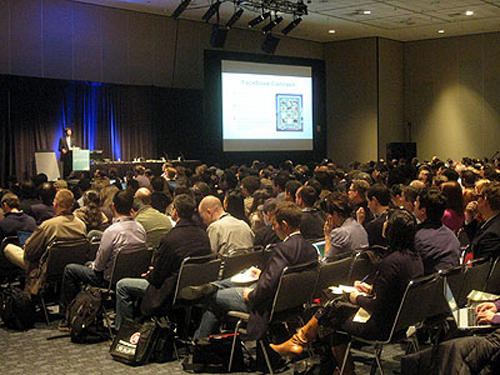业内话题:社交游戏开发者何时能够赢得尊重?
在游戏领域,吸金能力并不能赢得尊重。尽管Facebook上的游戏,即所谓的“社交游戏”在近几年中实现了繁荣发展,社交游戏巨头Zynga的身价也超过了EA,但社交游戏在硬核玩家或传统游戏公司中的口碑仍然不佳。
在上周于旧金山举办的游戏开发者大会上,来自任天堂的游戏设计先驱宫本茂的只言片语都能牵动大量追随者的神经,与之相反的是,社交游戏开发者却不得不费尽心力,为自己的事业正名。在本届大会的一场“社交游戏开发者宣泄会”上,Playdom首席设计师斯科特·乔恩·西格尔(Scott Jon Siegel)在发言中表示,在过去两年中,Facebook游戏已发生了巨大的变化。
据他所称,“一款游戏可以改变整个游戏行业,这款游戏就是《Farm Town》”。据游戏邦了解,《Farm Town》启蒙了Zynga旗下的《FarmVille》等农场类游戏的开发,这类游戏主要通过鼓励玩家点击广告,或者通过微交易模式购买谷仓、牲口等虚拟商品创造收益。
但西格尔同时也表示,这种模式培养了一个不好的习惯,它驱使开发者们“一切向钱看齐”,“一切为了吸引用户”,但却不是为了“创造好游戏”。
游戏邦获悉Playdom在GDC大会上介绍了即将推出的两款新游戏,计划在3月21日发布《Deep Realms》,该游戏是一款以中世纪城镇为背景的角色扮演类游戏。除此之外,该公司还将在一周后发布益智游戏《Gardens of Time》。该游戏由两部分组成,一部分是寻物游戏,另一部分是许多杂志上流行的那种将两张相似的图片摆在一起,让用户找出不同点的游戏。
这款游戏的创意总监艾瑞克·托德(Eric Todd)表示,他花了很多心思去想游戏的故事背景。在加入Playdom团队之前,托德曾经参与开发了电脑游戏《孢子》(Spore),玩家在该游戏中的任务是将自己创造的生物在一个新世界中放生。
Zynga首席执行官马克·平卡斯(Mark Pincus)虽然没有出席本届大会,但派遣了首席设计师布莱恩·雷诺兹(Brian Reynolds)为社交游戏辩护,据雷诺兹所述,《FarmVille》、《FrontierVille》和《CityVille》等Zynga社交游戏为用户创造了互动和沟通的桥梁。
尽管如此,GDC大会中对社交游戏的批判性声音仍未彻底消失。游戏邦获悉,任天堂CEO岩田聪在演讲中发表了智能手机游戏、社交游戏的廉价论。不过其竞争对手、日本主流掌机游戏公司科乐美却迅速为旗下产品添加了社交网站功能。另外,掌握了Fox、DMGT和数家英国网站的传媒巨头新闻集团,最近也成立了一个专门的社交游戏发行部门。
Facebook创始人马克·扎克伯格(Mark Zuckerberg)曾在去年10月时表示,因为结合了社交网站功能,游戏行业已成为发展最快的经济领域,“Facebook平台上的游戏及其相关产品的发展非常惊人,Zynga就是一个很好的例子,我想在5年后,世界还会出现更多个像Zynga一样成功的公司。”
对社交游戏开发者来说,目前的当务之急就是让所以质疑者相信,成为Zynga是一个神圣的目标。(本文为游戏邦/gamerboom.com编译,转载请注明来源:游戏邦)
Why makers of Facebook games get no respect
In the world of gaming, money doesn’t necessarily buy respect.
Online games designed to be played on Facebook, called “social games” in industry jargon, have multiplied in the last few years, since the world’s largest social network introduced a Web platform for friend-enhanced applications.
But even at a time when Zynga Game Network, which makes the wildly popular “FarmVille,” is valued higher than software giant Electronic Arts, social games don’t have much street cred among hard-core gamers or industry veterans.
A clearer picture of these dynamics emerged at last week’s Game Developers Conference in San Francisco, where CNN attended panels and interviewed designers and programmers.
In the natural pecking order of game-making, visionaries like Nintendo’s Shigeru Miyamoto can attract followers that hang on his every word. But at the opposite end, creators of social games struggle to legitimize their work among their peers.
This theme was pervasive enough to warrant its own panel at GDC. The hour-plus discussion was titled “No Freaking Respect! Social Game Developers Rant Back,” and it attracted a large audience.
Scott Jon Siegel, a lead designer for Playdom, Disney’s social-game division, spent his time onstage feeding many of the stereotypes. Something changed two years ago that formed a storm cloud over the land of Facebook games, he said.
“One game changed the entire games industry,” Siegel said, standing in front of a silhouette of a cartoon farmer. “And this game is ‘Farm Town.’ ”
“Farm Town” was a precursor to the more popular “FarmVille” from Zynga. These games earn revenue by encouraging players to click on advertisements, or through micro-payments, in which players cough up real money in exchange for virtual goods, such as barns or livestock.
“This formula instills bad habits,” Siegel said. “You’re doing ‘making lots of money’ right. You’re doing ‘engaging lots of users’ right,” he said, addressing developers. “You’re not making good games.”
Playdom introduced two new Facebook games during GDC. The company plans to release “Deep Realms” — a story-driven, role-playing game set in a medieval town — on March 21.
About a week later, Playdom intends to debut a puzzle game called “Gardens of Time.” One part is a “hidden object” scavenger hunt, and another is a new take on those popular games in magazines or on bar machines that present two seemingly identical pictures and ask people to spot the differences between them.
Eric Todd, the game’s creative director, said he put a lot of thought into themes for his game’s story, which involves members of an organization tasked with protecting the flow of time. Before Playdom, Todd worked on the complex computer game “Spore,” in which players populate a new world with creatures they create.
Mark Pincus, Zynga’s CEO and therefore the veritable king of social gaming, didn’t attend his company’s GDC party or appear on any panels. Instead he dispatched chief designer Brian Reynolds, who defended his company’s work, saying that Zynga’s games — most recently, “FarmVille” spinoffs such as “FrontierVille” and “CityVille” — help people keep in touch with friends.
But that didn’t stop other GDC attendees from criticizing the social-games trend. Nintendo President Satoru Iwata, in his keynote speech, commended competitors in the console arena but had no kind words for gaming on smartphones or social networks.
Even so, rival Konami, a major Japanese console game company, is moving quickly to add social networking features. And two news media empires are making aggressive plays in the social-game space.
News Corp., which owns Fox, and DMGT, which owns several big UK sites, recently created divisions for publishing Facebook games.
Gaming has outpaced other categories in its successful adoption of social networks, said Facebook founder Mark Zuckerberg during an October announcement of his support for a venture capital fund dedicated to social apps.
“The games and stuff that have happened on this platform are just amazing. Zynga is a great example of this,” Zuckerberg said. “Five years out, I think the world is going to look a lot more like Zynga.”
For developers of social games, the challenge now is convincing skeptics that becoming Zynga is an honorable goal.(source:cnn.com)








































 闽公网安备35020302001549号
闽公网安备35020302001549号